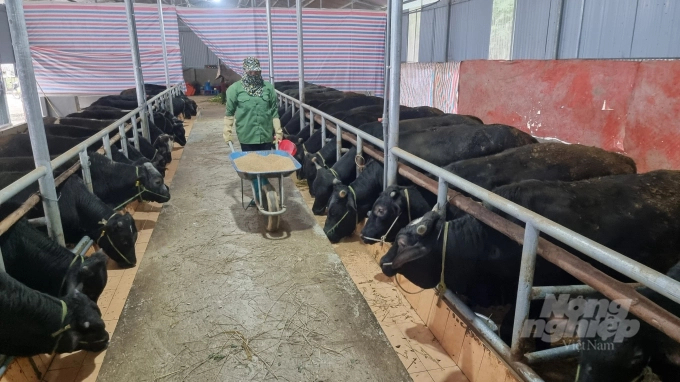June 21, 2025 | 02:47 GMT +7
June 21, 2025 | 02:47 GMT +7
Hotline: 0913.378.918
June 21, 2025 | 02:47 GMT +7
Hotline: 0913.378.918

Nghien Loan’s buffalo and cow market contribute to the promotion of the cattle-raising industry in Bac Kan province. Photo: Toan Nguyen.
Currently, in Bac Kan province, many markets for purchasing and selling livestock have been formed, stemming from the needs of people to exchange goods. Of which, the most famous is the Nghien Loan’s buffalo and cow market, located in Nghien Loan commune, Pac Nam district, with the number of transactions reaching 400-600 cows/market and a total value of over VND 10 billion.
Nghien Loan buffalo market, which is held on the 2nd and 7th lunar day, is not only a place for goods trading of local people but also an attraction for many people from Pac Nam and Ba Be districts (Bac Kan province); along with adjacent areas of Tuyen Quang province (Chiem Hoa and Na Hang districts), Cao Bang province (Bao Lac, Bao Lam and Nguyen Binh districts) in terms of trading buffaloes, cows, horses, … Additionally, the market also attracts a large number of traders from Thai Nguyen, Hanoi, Hai Duong, Bac Ninh and many other provinces and cities arriving for purchases of cattle to bring back to the lowlands for selling.
Bustling activities from buffalo and cow markets partly reflect the level of development of cattle raising in Bac Kan province. Pac Nam district, for example, contains a total number of buffaloe herds and cowherds of about 20,000.
Many households invested in the construction of fortified barnes and grass areas for livestock in the form of fattening or breeding. Since then, it is normal for people to earn hundreds of millions of dong a year, a few are able to earn billions from raising buffaloes and cows.

Raising 3b cows is a suitable direction based on the climate and soil conditions of Bac Kan province. Photo: Toan Nguyen.
According to Bac Kan Department of Animal Health, the total number of herds of cattle (buffaloes, cows, horses) in the province is nearly 70,000.
Although the number has decreased compared to previous years due to the epidemic, the husbandry method has been restructured, shifting from small-scale and dispersed livestock production to developing large-scale livestock production, utilizing science and technology.
Since then, it has contributed to the growth of the livestock sector, stabilized the consumption market and the selling prices of products in the highlands of Bac Kan province.
A typical example of large-scale investment in cattle herding by indigenous people in Bac Kan province is Ms. Lanh Thi Nhu (Nguyen Phuc commune, Bach Thong district). Ms. Nhu established Hung Manh Cooperative in 2020, with the aim of developing a commodity-oriented agricultural economy.
After a period of experimentation in many different types of production, from 2021 Hung Manh Cooperative decided to completely switch to the field of large-cattle commercial raising. Currently, the livestock farm of Hung Manh Cooperative has mainly 3b cows with 80 heads, 7 breeding buffaloes and some other livestock such as chickens, ducks, swans, …
Ms Lanh Thi Nhu, director of Hung Manh Cooperative said: Through many trips to learn and experience in many places, we decided to invest mainly in raising 3B cows because it is suitable for local climatic and soil conditions. The raising is also applied according to science and technology, ensuring the health of the herd and adequate nutrition. The results are proficient, the cows gain weight from 40-50kg/month, the buffaloes are fully grown, leading to fast reproduction and fast growth.
It can be said that the husbandry of Hung Manh Cooperative has brought stable jobs for 6 workers with an income of VND 6 million/person/month. Including 4 people specializing in growing grass and cutting grass, 2 people specializing in cleaning barns and taking care of animals. In addition, the cooperative also employed a number of seasonal workers with a salary of VND 200,000/person/day.
Mr. Trinh Van Hien, a worker of Hung Manh Cooperative shared: “I work here and find my job and income very stable. Raising in captivity has completely changed from the traditional way of husbandry in the locality. I personally feel that work efficiency is higher, animals grow faster and disease is limited”.
Translated by Hoang Duy
![Turning wind and rain into action: [9] Digitizing hydrometeorological data in response to climate change](https://t.ex-cdn.com/nongnghiepmoitruong.vn/608w/files/news/2025/06/17/z6704423696987_15fd32ffc26d590d204d520c9dac6786-nongnghiep-165943.jpg)
(VAN) Farmers have begun accessing hydrometeorological applications to adjust their cropping schedules, aiming to ensure productivity and adapt to climate change.
![Turning wind and rain into action: [8] Real-time salinity detection and early warning technology](https://t.ex-cdn.com/nongnghiepmoitruong.vn/608w/files/news/2025/06/17/z6704423696987_15fd32ffc26d590d204d520c9dac6786-nongnghiep-151127.jpg)
(VAN) Thanks to the integration of modern hydrological-hydraulic models, remote sensing technologies, and artificial intelligence, the accuracy of hydrological forecasting has significantly improved.
![Turning wind and rain into action: [7] Early disaster warnings help marine farmers minimize losses](https://t.ex-cdn.com/nongnghiepmoitruong.vn/608w/files/news/2025/06/17/z6704423696987_15fd32ffc26d590d204d520c9dac6786-nongnghiep-142942.jpg)
(VAN) In recent years, thanks to early disaster warnings and forecasting, marine farmers in Khanh Hoa province have been able to reduce risks and losses, thereby improving production efficiency.
![Turning wind and rain into action: [6] ‘Four on-the-spot’ disaster management software](https://t.ex-cdn.com/nongnghiepmoitruong.vn/608w/files/news/2025/06/17/e5a48259d6a262fc3bb3-nongnghiep-183800.jpg)
(VAN) By simply activating the scenario on the disaster management software, the relevant authorities immediately know how many households need to be evacuated, where to evacuate them to, and by what means of transportation…
![Turning wind and rain into action: [5] Hue applies modern technology in disaster forecasting](https://t.ex-cdn.com/nongnghiepmoitruong.vn/608w/files/news/2025/06/17/z6704423696987_15fd32ffc26d590d204d520c9dac6786-nongnghiep-093938.jpg)
(VAN) In Hue city, modern technology has recently been applied in meteorological and hydrological forecasting and warning, helping to reduce the damage caused by natural disasters.

(VAN) A cutting-edge farming technique being implemented on an experimental ranch in Arizona's Sonoran Desert has already saved a billion gallons of water over five years, according to Civil Eats.

(VAN) Poultry and pig production and the environment can be boosted through enhanced water technology, according to new research.